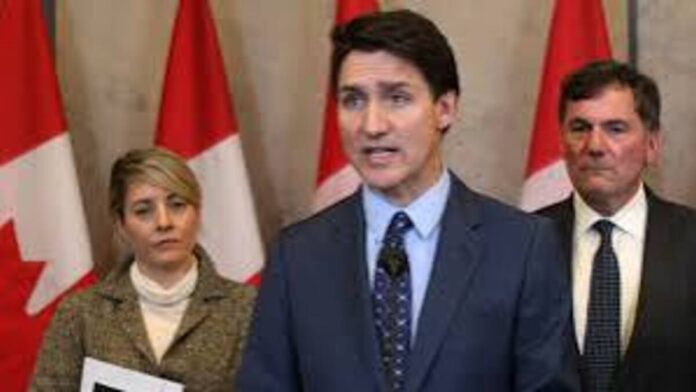On Monday, Canadian Prime Minister Justin Trudeau charged that the Indian government had committed a “fundamental error” by assisting illegal activity within the country.
During an Ottawa press conference, Trudeau emphasised the significance of this weekend’s meeting between their national security advisors in Singapore and the continued tensions between the two countries.
“When I spoke to PM Modi at the end of last week, I highlighted how incredibly important meeting between our national security advisors in Singapore this weekend was going to be. He was aware of that meeting and I pressed upon him that the meeting needs to be taken very, very seriously,” Trudeau said.
The press conference was also attended by Canadian Ministers of Foreign Affairs Melanie Joly and Dominic LeBlanc, who oversee intergovernmental affairs and public safety.
Speaking about the wider ramifications for Canada-India ties, Trudeau claimed that by assisting criminal activity against Canadians, the Indian government had committed a “fundamental error”.
“The Indian government made a fundamental error in thinking that they could engage in supporting criminal activities against Canadians, here on Canadian soil, be it murder or extortion. This is absolutely unacceptable,” Trudeau claimed.
Trudeau claimed that Canada is commitment to working with India despite the tensions. “This is not a choice that Canada made to create a chill in Canada-India relations. India is an important democracy, a country with which we have deep historical people-to-people business ties at a time where the instability around geopolitics means democracies have to stick together. That is why when we started to understand through intelligence agencies that India was possibly if not probably, behind (Hardeep Singh) Nijjar’s killing, the killing of a Canadian on Canadian soil last summer, our first choice to the government of India to say, we know this has happened, work with us to fix this,” he claimed. “We don’t want to be having this fight, but obviously the killing of a Canadian on Canadian soil is not something that we can ignore as a country,” he added.
Trudeau further said that Canada had taken a transparent approach and sought cooperation with Indian authorities. “So every step of the way we have apprised India of what we know. I’ve spoken directly with Prime Minister Modi. We have engaged with intelligence counterparts, and unfortunately, every step of the way, both after I made the statement in the House of Commons last September and till now, the response of the Indian government has been to deny, to obfuscate, to attack me personally and the integrity of the government of Canada and its officials and its police agencies,” he said.
He said, among other things, that Canada had tried to work with India to protect its citizens. Trudeau went on to say that in an effort to protect Canadians, Canadian authorities have made an effort to collaborate with India.
“We have simply said we’re going to allow our agencies to do the work, particularly to move from intelligence collection from agencies to police investigations that result in arrests, trials and consequences within a rigorous robust and independent judicial system. That has been our approach every step of the way. Indeed, over this past week, when the RCMP reached out to its law enforcement counterparts in India, there was a path where we could have worked together to ensure accountability and changes and steps that would have resulted in keeping Canadians safe because that is our top priority,” he said. However, Trudeau said these efforts were rebuffed by India.
“The Indian government rejected those advances and rejected our attempts to find some way through this. And that brought us to this point of having to disrupt the chain of operations that go from Indian diplomats here in Canada to criminal organisations to direct violent impacts on Canadians right across this country,” he added.
Following claims made by Royal Canadian Mounted Police (RCMP) Commissioner Mike Duheme that they have knowledge on specific criminal activities carried out by operatives of the Indian government, there has been a diplomatic backlash.
After calling Canada’s Charge d’Affaires Stewart Wheeler and expressing that the “baseless targeting” of the Indian High Commissioner and other diplomats and staff in Canada was totally intolerable, India on Monday expelled six Canadian diplomats.
Six Indian diplomats were reportedly removed from Canada after police found evidence linking them to an Indian government “campaign of violence,” according to a Canadian government source previously cited by news agency Reuters.
The Indian High Commissioner and other diplomats were allegedly “persons of interest” in an investigation, according to a diplomatic communication from Canada that India “strongly” rejected on Monday. India called the communication “preposterous imputations” and claimed it was a part of the Justin Trudeau government’s political agenda.
India issued a sharp statement accusing Canadian Prime Minister Trudeau of harbouring animosity towards India for a long time and of deliberately giving terrorists and violent extremists room to operate in order “to harass, threaten and intimidate Indian diplomats and community leaders in Canada.”
After Canadian Prime Minister Justin Trudeau stated in a parliamentary speech this year that he had “credible allegations” that India had a hand in the murder of Khalist terrorist Hardeep Singh Nijjar, tensions between India and Canada deteriorated.
Nijjar was shot and killed in June 2023 outside a gurdwara in Surrey. The Indian National Investigation Agency had classified him as a terrorist in 2020.
India vehemently refuted the accusations, characterising them as “absurd” and “motivated.” Additionally, it charged that Canada has allowed radical and anti-Indian elements to flourish there.




